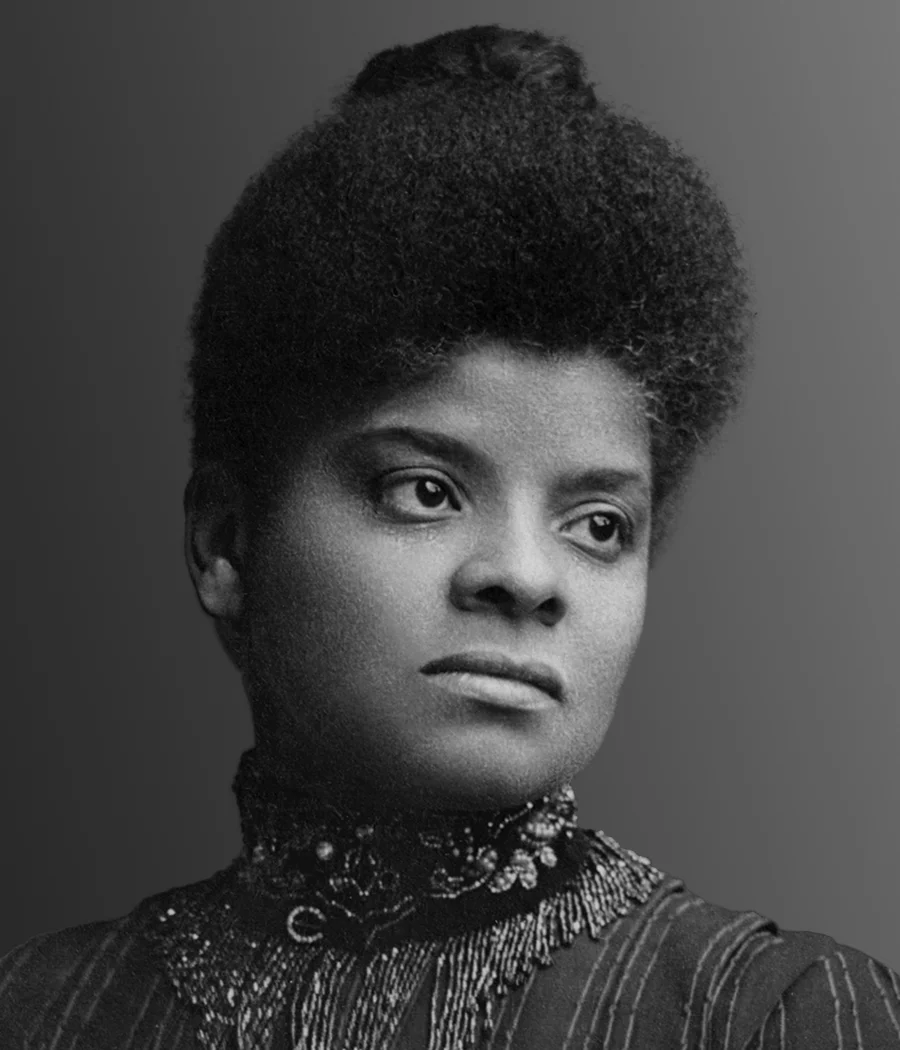Introduction to Ida B. Wells
Ida B. Wells was a pioneering African American journalist, educator, and a staunch civil rights activist whose work has left an indelible mark on American history. Born on July 16, 1862, in Holly Springs, Mississippi, Wells emerged from a tumultuous socio-political landscape characterized by the aftermath of the Civil War and rampant racial discrimination. The daughter of former slaves, Wells was the eldest of eight children. Her parents, Elizabeth and James Wells, instilled in her a strong sense of justice and resilience, qualities that would define her lifelong mission to combat racial injustices.
Wells’s early life was profoundly shaped by the systemic racism and violence she witnessed in the Mississippi Delta. The assassination of her father during a white mob attack and her mother’s subsequent passing from sickness left young Ida to support her siblings at the tender age of sixteen. This harsh reality became a crucial catalyst for her activism, motivating her to pursue education and eventually embark on a career in journalism. Wells attended Rust College in Holly Springs, where her education laid the foundation for her future endeavors.
During the late 19th century, when Jim Crow laws institutionalized racial segregation, Wells used her platform to address the urgent matters of her time. The rampant lynching of African Americans stirred her to action, and she began documenting these heinous acts through investigative reporting. Her courage to speak out against injustice against her community, particularly in her famous pamphlet, “Southern Horrors: Lynch Law in All Its Phases,” established her as a formidable voice in the struggle for civil rights. Wells’s relentless dedication not only amplified the plight of African Americans but also placed her at the forefront of the early civil rights movement, solidifying her legacy as a crucial figure in the fight for justice and equality. Through her work, she challenged the dominant narratives of her time, making significant contributions to journalism and civil rights advocacy.
The Early Years: Education and Personal Life
Ida B. Wells was born on July 16, 1862, in Holly Springs, Mississippi, during a tumultuous period in American history. Her family had a profound impact on her values and work ethic. Both her parents were active in the struggle for education and civil rights, which instilled in Wells a sense of responsibility from a young age. Her father, a carpenter and a member of the Freedmen’s Aid Society, emphasized the importance of education, while her mother, a former slave, was a teacher who nurtured a love for learning in her children.
Tragedy struck early in Wells’ life when she lost both of her parents to yellow fever in 1878. At just sixteen, she assumed the responsibility of raising her younger siblings, which thrust her into a position of leadership and instilled a strong sense of resilience. Her experiences with loss also deepened her understanding of the struggles faced by African Americans, particularly women, in a society rife with racial prejudice. This early exposure to injustice would later shape her commitment to activism.
Despite the challenges she encountered, Wells recognized the importance of education as a means of empowerment. She attended Rust College but was expelled due to her outspoken nature. This setback did not deter her; instead, it fueled her desire to advocate for civil rights. Her early experiences with systemic racism and societal limitations ignited a fire within her, pushing her toward journalism and social activism. These formative years not only provided the foundation for her subsequent work but also highlighted the vital role of education and personal resolve in the fight for justice.
Journalism as Activism: The Power of the Pen
Ida B. Wells firmly believed that journalism could be a powerful tool for social change and justice. As an astute journalist, she employed her writing skills not just to report facts, but to advocate for the disenfranchised and to challenge the pervasive injustices of her time. In 1889, she co-founded a newspaper named The Memphis Free Speech, which would become a platform for voicing the grievances of African Americans in the South. This initiative marked a significant turning point in her career, as it allowed her to reach a broader audience and influence public opinion through the written word.
Wells’s most notable work centered around her fearless reporting on the lynching epidemic that plagued the American South. By meticulously documenting the circumstances surrounding these brutal acts of violence, she was able to shed light on the realities faced by Black individuals and communities. In her publications, she exposed the often unfounded accusations used to justify lynching and highlighted the complicity of law enforcement and local governments in these heinous crimes. This investigative journalism not only provided evidence of racial terror but also questioned the broader social norms and systems that allowed such injustices to persist.
The impact of her reporting extended beyond mere documentation. Wells’s journalistic efforts ignited a national conversation on race, violence, and justice, illustrating the power of the pen as an agent for change. Through her relentless pursuit of truth, she inspired many to recognize and address the systemic racism embedded within American society. Wells’s activism through journalism laid the groundwork for future civil rights movements and remains a pertinent example of how one individual can challenge the status quo through informed writing and courageous reporting.
The Lynching Crisis: A Call for Justice
The lynching crisis that erupted in America during the late 19th and early 20th centuries represented one of the darkest chapters in the nation’s history. This heinous form of racial violence was predominantly aimed at African Americans and served as a tool of oppression and terror. Ida B. Wells emerged as a passionate and fearless advocate against this grotesque injustice. Her investigative work and her writings brought much-needed attention to the widespread occurrence of lynching, which was often cloaked in a veneer of legality and social acceptance.
<p.wells 1892.="" a="" accusations="" african="" against="" all="" american="" and="" as="" black="" brutally="" by="" calvin="" cases="" cases,="" catalyst="" contradicted="" criminality="" deserving="" details="" documented="" economic="" evidence="" fates.="" for="" groundbreaking="" henry="" her="" horrors:="" in="" incident="" individuals.<p.wells’ a="" about="" acknowledged.="" activism="" advocacy="" african="" against="" alert="" allies.="" america.
Wells’ Advocacy for Women’s Rights
Ida B. Wells emerged as a pioneering advocate for women’s rights during a time when the suffrage movement was gaining momentum in the United States. Her commitment to the cause of women empowerment was intricately linked to her broader fight against racial injustice. Wells understood that the struggles for gender and racial equality were interwoven, highlighting the necessity of addressing both issues concurrently. This intersectionality became a cornerstone of her advocacy, as she strove to ensure that the concerns of African American women were not overlooked in the male-dominated suffrage discourse.
Wells was instrumental in raising awareness about the unique challenges that African American women faced, arguing that their participation in the suffrage movement was critical for achieving true equality. She was fervent in her belief that the fight for women’s rights could not ignore the prevailing racism of the time. By weaving the narratives of both women’s and civil rights, Wells offered a more comprehensive perspective on empowerment, emphasizing that African American women deserved a seat at the table in every aspect of societal engagement.
In 1913, Wells actively participated in the National American Woman Suffrage Association (NAWSA) parade in Washington, D.C. However, her experience there demonstrated the racial biases present even within the women’s rights movement. Despite her prominence, she was asked to march at the back of the parade, which she firmly opposed. This incident exemplified her unwavering stand against racism within the suffrage movement and underscored her belief that true progress required inclusivity and recognition of all women’s rights, regardless of their racial background.
Wells’ advocacy for women’s rights was characterized by her passionate writings and speeches, where she pressed for equal access to education, employment, and voting rights. Her legacy serves as an enduring reminder that the fight for justice is far-reaching, transcending race and gender to uphold the ideals of equity for all.
Legacy of Ida B. Wells: Impact and Recognition
Ida B. Wells, an indomitable figure in American history, has left an indelible mark on both activism and journalism. Her commitment to social justice and her relentless crusade against racial violence have significantly influenced generations of activists and journalists dedicated to combating inequality. Wells’ pioneering work, particularly in documenting lynchings, not only brought national attention to the appalling realities faced by African Americans but also established a template for investigative journalism that is still emulated today.
Her influence extends beyond her lifetime, as contemporary movements continue to draw inspiration from her steadfast principles and tenacity. Organizations advocating for civil rights and social justice often reference Wells’ methods of grassroots organizing and her ability to mobilize communities against injustice. Her legacy is particularly potent today, influencing campaigns against systemic racism and advocating for equitable treatment for all. Numerous activists have acknowledged how Wells’ work ignited their own passion for justice, affirming that the lessons drawn from her struggle are as relevant now as they were in her time.
Wells has received numerous posthumous honors that recognize her invaluable contributions to society. One of the most notable is her induction into the National Women’s Hall of Fame, which celebrates women who have made significant contributions to the country. This honor underscores the recognition of her as a trailblazer in journalism and civil rights. Furthermore, various institutions and initiatives have named scholarships, awards, and even public spaces after her, ensuring that future generations remain aware of her legacy. In contemporary discussions surrounding social justice, Wells’ voice continues to resonate, illustrating the powerful impact one individual’s dedication to truth and justice can achieve.
Challenges and Opposition Faced by Wells
Ida B. Wells, a pioneering journalist and civil rights activist, faced numerous challenges and considerable opposition throughout her career. Her bold stance against systemic racism and her commitment to social justice placed her at the center of a turbulent socio-political landscape. One of the most profound obstacles Wells encountered was social ostracism from her contemporaries, particularly within certain African American communities. Many viewed her outspoken critique of lynching and her refusal to remain silent about racial injustice as a threat to social harmony. This led to her isolation from those who preferred a more conciliatory approach to racial issues.
Additionally, Wells faced significant threats to her personal safety as a result of her activism. Her journalism, which exposed the brutal realities of lynching, particularly in the South, placed her life in jeopardy. Numerous death threats were directed towards her, and at one point, a mob in her hometown of Memphis destroyed her newspaper office. Despite this constant danger, Wells demonstrated remarkable resilience, continuing to travel and speak publicly about the atrocities she uncovered. Her courage in confronting such peril is a testament to her unwavering commitment to justice and equality.
Furthermore, opposition arose not only from white supremacist groups but also from some factions within the women’s suffrage movement. Although Wells advocated for the inclusion of African American women in the struggle for voting rights, she frequently found herself at odds with suffragists who prioritized the interests of white women. This marginalization illustrated the complexities and contradictions of her fight, as she refused to compromise her principles for the sake of broader acceptance. Through it all, Wells remained steadfast in her mission, exemplifying a tenacity that has inspired generations of activists who continue to champion justice today.
Ida B. Wells in Modern Context
Ida B. Wells’ legacy remains a vital force in understanding and addressing contemporary social justice issues. Her pioneering investigative journalism and ardent activism laid the groundwork for later civil rights movements and continue to echo in present-day battles against racial injustice, police violence, and gender inequality. Wells’ comprehensive reports on lynching exposed the horrific realities of racial violence, making her a key figure in the push for justice. Today, as communities grapple with systemic racism and police brutality, her work serves as a reminder of the ongoing struggle against oppression and the need for accountability. The Black Lives Matter movement, for instance, draws on her ideals of activism and social reform, advocating for the rights of marginalized communities and amplifying the voices of those often silenced by societal structures.
Furthermore, the implications of Wells’ fight for gender equality are equally relevant. In an era where women still confront significant barriers in numerous spheres—from professional workplaces to political representation—Wells’ insistence on the intersectionality of race and gender remains a touchstone for modern feminism. Activists today continue to challenge the systemic inequality that Wells documented, emphasizing a holistic approach to social justice that acknowledges how various forms of discrimination intersect and compound each other. Her emphasis on the necessity of women’s involvement in social reform has inspired many initiatives that promote female leadership in the quest for racial justice.
Wells’ dedication to truth-telling is a critical lesson for today’s journalists and activists, who often confront misinformation and resistance in their efforts to enact change. Just as Wells bravely reported the harsh realities of her time, contemporary advocates strive to shed light on current injustices, underscoring the timelessness and urgency of her message. In essence, Ida B. Wells’ activism and commitment to justice echo powerfully in the present context, reminding us that the fight for equality and dignity is far from over.
Conclusion: Why We Must Tell Her Story
Ida B. Wells stands as a formidable figure in American history, whose fierce advocacy for justice and civil rights continues to resonate today. As a pioneering journalist and activist, she utilized her writing to expose the atrocities of lynching and challenged societal norms that perpetuated racial and gender inequality. Wells’ impact transcended her time, demonstrating that the fight for justice is a continual struggle that requires unwavering courage and commitment.
In the realm of journalism, Wells broke barriers and set a precedent for future generations of reporters, particularly women and people of color. Her meticulous research and fearless reporting expanded the scope of journalistic integrity. By documenting the grotesque realities of violence against African Americans, she brought national and international attention to issues that were often ignored. This legacy is critical today, as the media continues to play a vital role in advocating for social justice and accountability.
Moreover, Wells’ contributions to the women’s rights movement are invaluable. She was not only a suffragist but also a vocal advocate for the intersectionality of race and gender, emphasizing that the struggles for women’s rights and racial equality are intertwined. This perspective is increasingly recognized in contemporary discourse, reminding us that addressing social justice requires an inclusive approach.
As we navigate the complexities of our current social landscape, it is essential to remember figures like Ida B. Wells. Her story empowers us to confront injustice and inspires us to demand change. By sharing her legacy, we cultivate awareness and foster a culture that values truth and justice. Telling her story honors her sacrifices and motivates us in the ongoing battle against oppression, making her legacy not only relevant but necessary for our collective progress.








